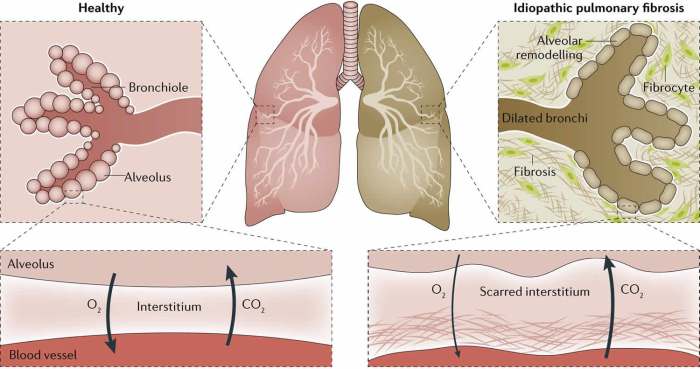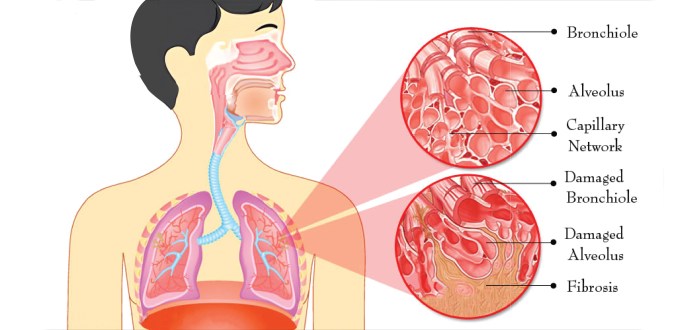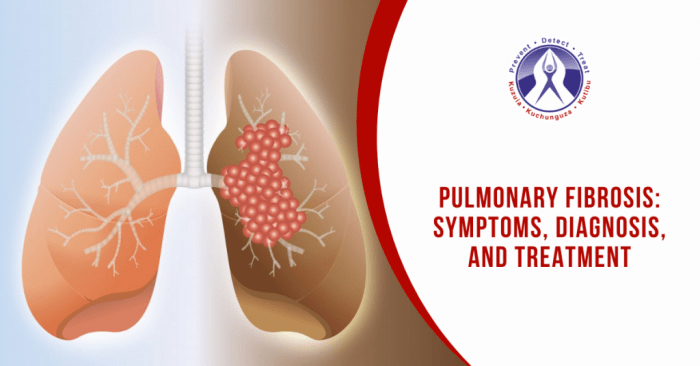Pulmonary fibrosis symptoms, a telltale sign of a progressive lung disease, unveil a complex tapestry of respiratory, systemic, and other manifestations. Understanding these symptoms is crucial for early detection, timely diagnosis, and effective management of this debilitating condition.
From breathlessness to fatigue and beyond, this comprehensive guide delves into the diverse array of pulmonary fibrosis symptoms, their progression, and their profound impact on daily life and overall well-being.
Pulmonary Fibrosis Symptoms

Pulmonary fibrosis is a condition characterized by the scarring and thickening of lung tissue, making it difficult to breathe. Symptoms of pulmonary fibrosis can vary depending on the stage of the disease, with some people experiencing mild symptoms while others may have severe and debilitating symptoms.
Common Symptoms
Common symptoms of pulmonary fibrosis include:
- Shortness of breath, especially with exertion
- Dry cough that persists
- Fatigue
- Crackling sounds in the lungs (rales)
- Clubbing of fingers and toes
Less Common Symptoms
Less common symptoms of pulmonary fibrosis may include:
- Chest pain
- Weight loss
- Night sweats
- Joint pain and muscle weakness
- Difficulty sleeping
- Depression
Respiratory Symptoms

Pulmonary fibrosis primarily affects the lungs, leading to a range of respiratory symptoms. These symptoms can vary in severity and significantly impact daily life.
Shortness of Breath (Dyspnea), Pulmonary fibrosis symptoms
Shortness of breath, also known as dyspnea, is a common and often early symptom of pulmonary fibrosis. It typically manifests as a feeling of breathlessness or difficulty breathing, even during minimal exertion or at rest. As the condition progresses, dyspnea can become more severe, limiting daily activities and affecting quality of life.
Coughing
Coughing is another common symptom associated with pulmonary fibrosis. The cough is typically dry and hacking, without producing mucus. In some cases, the cough may be accompanied by blood-tinged sputum, indicating more advanced disease.
Wheezing and Chest Tightness
Wheezing, a whistling sound during breathing, and chest tightness are less common respiratory symptoms of pulmonary fibrosis. They can occur due to inflammation and narrowing of the airways. However, unlike asthma, wheezing in pulmonary fibrosis is not typically relieved by bronchodilators, which are medications used to open up the airways.
Systemic Symptoms

Pulmonary fibrosis affects not only the lungs but also the entire body. Systemic symptoms refer to those that affect the whole body and are often associated with the disease.
Fatigue and Weakness
Individuals with pulmonary fibrosis often experience persistent fatigue and weakness. This can significantly impact their daily lives, making it difficult to perform routine activities and maintain a normal level of energy.
Weight Loss and Loss of Appetite
Weight loss and loss of appetite are common symptoms of pulmonary fibrosis. The disease can lead to an increased metabolic rate, causing the body to burn more calories. Additionally, the inflammation and scarring of the lungs can make it difficult to breathe, which can further reduce appetite.
Muscle and Joint Pain
Muscle and joint pain can also be associated with pulmonary fibrosis. The inflammation and scarring of the lungs can put strain on the muscles and joints, leading to pain and stiffness. This can affect mobility and make it difficult to perform everyday tasks.
Conclusion
In the face of pulmonary fibrosis, recognizing the symptoms and their implications is a crucial step towards seeking timely medical attention, accessing appropriate treatment, and implementing coping mechanisms. By arming ourselves with knowledge, we empower individuals with pulmonary fibrosis to navigate the challenges of the disease and live fulfilling lives.
Questions Often Asked: Pulmonary Fibrosis Symptoms
What is the most common symptom of pulmonary fibrosis?
Shortness of breath (dyspnea) is the most prevalent symptom, often occurring during exertion and gradually worsening over time.
Can pulmonary fibrosis cause weight loss?
Yes, weight loss and loss of appetite are common symptoms due to increased energy expenditure and inflammation.
How does pulmonary fibrosis affect daily life?
Symptoms can significantly impact work, hobbies, and social interactions, leading to reduced mobility, fatigue, and emotional distress.